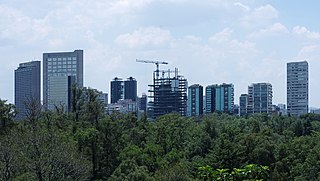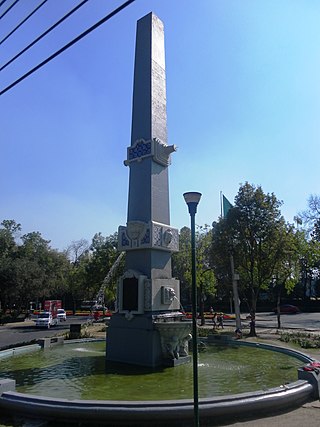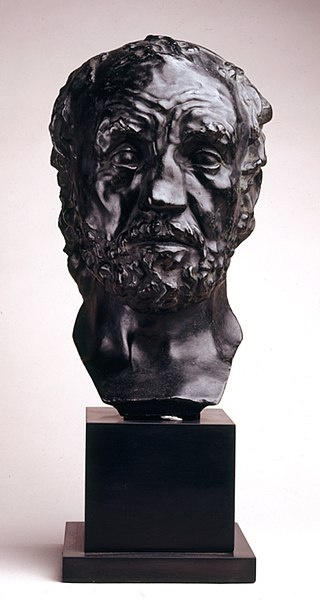
Coyoacán is a borough in Mexico City. The former village is now the borough's "historic center". The name comes from Nahuatl and most likely means "place of coyotes", when the Aztecs named a pre-Hispanic village on the southern shore of Lake Texcoco dominated by the Tepanec people. Against Aztec domination, these people allied with the Spanish, who used the area as a headquarters during the Spanish conquest of the Aztec Empire and made it the first capital of New Spain between 1521 and 1523.

Miguel Hidalgo is a borough (alcaldía) in western Mexico City, it encompasses the historic areas of Tacuba, Chapultepec and Tacubaya along with a number of notable neighborhoods such as Polanco and Lomas de Chapultepec. With landmarks such as Chapultepec Park and the Museo Nacional de Antropología, it is the second most visited borough in Mexico City after Cuauhtémoc where the historic center of Mexico City is located. Tacubaya and Tacuba both have long histories as independent settlements and were designated as “Barrios Mágicos” by the city for tourism purposes.

Carlos Slim Helú is a Mexican business magnate, investor, and philanthropist. From 2010 to 2013, Slim was ranked as the richest person in the world by the Forbes business magazine. He derived his fortune from his extensive holdings in a considerable number of Mexican companies through his conglomerate, Grupo Carso. As of November 2023, Bloomberg Billionaires Index ranked him as the 11th-richest person in the world, with a net worth of $88 billion, making him the richest person in Latin America.

Grupo Sanborns is a retailing arm of the Carlos Slim-run Grupo Carso that includes the namesake Sanborns restaurant and junior department store chain, Mixup music stores, iShop electronics stores, Sears department stores in Mexico, and until October 2023, Mexico's sole Saks Fifth Avenue store.

América Móvil is a Mexican telecommunications corporation headquartered in Mexico City, Mexico. It is the 7th largest mobile network operator in the world in terms of equity subscribers, as well as one of the largest corporations in the world. América Móvil is a Forbes Global 2000 company. As of Q1, 2019, América Móvil had 277.4 million wireless subscribers, and 84.3 million fixed revenue generating units.

Colección Jumex is a private art collection owned by Eugenio López Alonso. It includes around 2,800 works by Damien Hirst, Andy Warhol, Gabriel Orozco, Cy Twombly, Jeff Koons, Marcel Duchamp, Andreas Gursky, Darren Almond, Tacita Dean, Olafur Eliasson, Martin Kippenberger, Carl Hopgood, Bruce Nauman, David Ostrowski, Francis Alÿs, Urs Fischer, Gego, Donald Judd, Ed Ruscha, Nancy Rubins, Richard Prince, Stefan Brüggemann, and Martin Creed.
Grupo Carso is a Mexican global conglomerate company owned by Carlos Slim. It was formed in 1990 after the merger of Corporación Industrial Carso and Grupo Inbursa. The name Carso stands for Carlos Slim and Soumaya Domit de Slim, his late wife.

Carlos Slim Domit is a Mexican businessman and the son of Carlos Slim Helú.

Polanco is a neighborhood in the Miguel Hidalgo borough of Mexico City. Polanco is an affluent colonia, noted for its luxury shopping along Presidente Masaryk Avenue, the most expensive street in Mexico, as well as for the numerous prominent cultural institutions located within the neighborhood.

The Museo Soumaya is a private museum in Mexico City and a non-profit cultural institution with two museum buildings in Mexico City — Plaza Carso and Plaza Loreto. It has over 66,000 works from 30 centuries of art including sculptures from Pre-Hispanic Mesoamerica, 19th- and 20th-century Mexican art and an extensive repertoire of works by European old masters and masters of modern western art such as Auguste Rodin, Salvador Dalí, Bartolomé Esteban Murillo and Tintoretto. It is called one of the most complete collections of its kind.

Fernando Romero Havaux is a Mexican businessman, design curator, and architect. He is the founder of fr·ee and Archivo Diseño y Arquitectura. He is the son-in-law of Mexican billionaire, Carlos Slim.

Nuevo Polanco is an area of Mexico City formerly consisting of warehouses and factories, bordering the upscale Polanco on the north across Avenida Ejército Nacional. Officially it consists of two colonias, Granada and Ampliación Granada.

Man with the Broken Nose is a sculpture by Auguste Rodin created between 1863 and 1864 and approved by the Salon in 1875. It is considered the first by Rodin in which life is represented over the grace pervading the academic circles and aesthetic of the time.

The Falling Man is a sculpture by French artist Auguste Rodin modeled in 1882 and is part of Rodin's emblematic group The Gates of Hell.

Pierre de Wissant is a bronze sculpture by French artist Auguste Rodin, part of his sculptural group The Burghers of Calais. This sculpture represents one of the six burghers who, according to Jean Froissart surrendered themselves in 1347, at the beginning of the Hundred Years' War (1337–1453), in order to save the inhabitants of the French city of Calais from the English laying siege to the city.

Danaid is a sculpture by Auguste Rodin, based on the account in the Metamorphoses of Hypermnestra, eldest of the Danaïdes.

The Maiden Kissed by the Ghost is an 1880 sculpture by the French artist Auguste Rodin. It was first exhibited at his fourteenth exhibition, hosted by the National Society Salon. One of the marble versions of the work is now in the Museo Soumaya in Mexico City.

Glaucus is a sculpture by the French artist Auguste Rodin, first conceived in 1886 as a representation of the mythological figure Glaucus, son of Poseidon. Originally made in plaster, bronze casts of it are now in the Brooklyn Museum and the Museo Soumaya.

Suzon is an early bust of a woman by Auguste Rodin, created between 1872 and 1873 when he wholly worked on commissions. It was inspired by late 18th century Romantic works whilst Rodin was in exile in Brussels due to the Franco-Prussian War. He created it in homage to Albert-Ernest Carrier-Belleuse, another sculptor also in exile there who was highly influential on Rodin's early works.



















